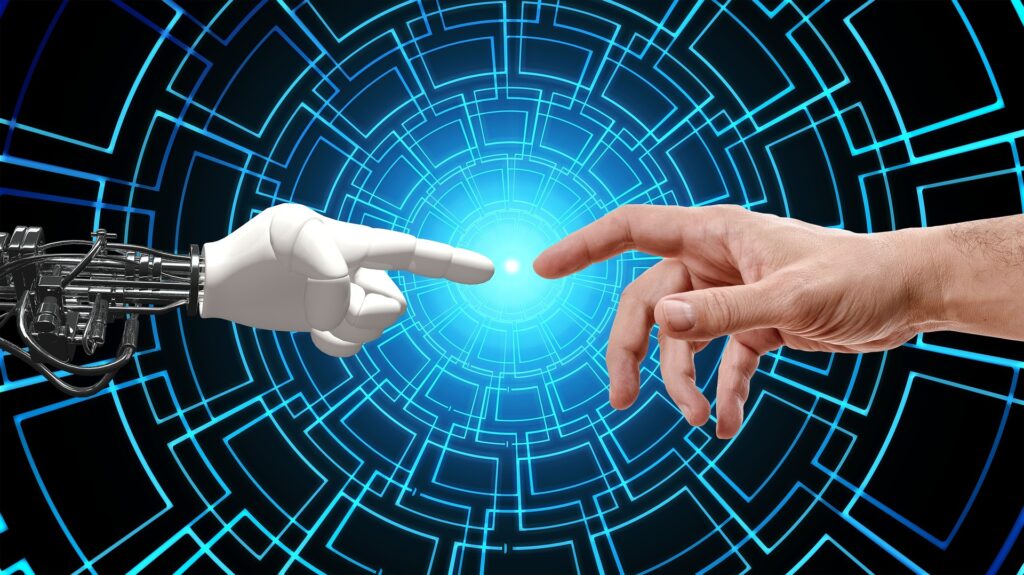DIGI Society
Embracing Digital Societal Development in my Role as an e-Service Manager
In my line of work, I encounter digital societal development on a daily basis. As an e-service manager, I am responsible for ensuring that our organization can provide learning opportunities for our customers online. We constantly strive to improve our online learning platform, exploring how digitalization can help us perform our tasks better and faster. However, it is essential not to overlook the human aspect in this work. Instead, the focus lies on how digitalization can be utilized as an empowering tool rather than a burdensome obligation.

The progress made over the past three years has been remarkable, and the recent pandemic has accelerated things even further. Simultaneously, we transitioned to a new learning environment that allows for even better monitoring and guidance of learning processes. The environment is not merely a repository of tasks but also facilitates easy communication between learners and instructors. Through data analysis, we can track progress and development more effectively.
Data protection and privacy (Gbdr) have brought discipline to our work. Personal information is not recorded haphazardly, and emails are not sent to a wide audience where everyone’s information is visible. Additionally, the etiquette of online meetings must be carefully considered, such as what content you share on your screen and who your audience is. I have addressed these concerns during my studies because, especially in the early days of remote meetings, it was disconcerting to be involved in discussions and see information that was not meant for me. Fortunately, significant improvements have been made, and attention is now being paid to these matters.
Embracing digital societal development in my role as an e-service manager has been both exciting and challenging. It has allowed us to provide enhanced learning experiences and overcome geographical limitations. However, we must always remember to strike a balance between leveraging digitalization’s benefits and upholding privacy, security, and human connection. By staying vigilant and continuously adapting, we can navigate the digital landscape effectively and create a positive impact on the lives of our customers.
Overall, the journey towards a digital society is ongoing, and I am grateful to be a part of it. I look forward to witnessing further advancements and finding innovative ways to utilize digital tools in our work for the benefit of all.
At the moment, the most influential thing in my work is artificial intelligence
Currently, open AI is captivating and challenging society as a whole. It seems that everywhere I turn, there is talk about OpenAI, and new information floods in from various channels related to my work. It’s as if algorithms have programmed my surroundings, immersing me in an OpenAI information bubble.
In my role, I have been compelled to consider how I guide my colleagues in harnessing the power of artificial intelligence. Simultaneously, I find myself advising students that the text generated by AI is not always entirely accurate.
The emergence of OpenAI has brought both excitement and caution. On one hand, the advancements in AI technology have opened up new possibilities, enabling us to automate tasks and access vast amounts of information. It has the potential to revolutionize industries, enhance productivity, and improve lives. However, it is crucial to approach AI-generated content with a critical mindset.
As AI algorithms generate text, it’s important to recognize that it is based on patterns and data rather than personal experiences or understanding. AI can assist us in processing large volumes of information and presenting us with insights, but it lacks human intuition and contextual understanding. We must remain vigilant and not blindly accept AI-generated content as absolute truth.
In my work, I emphasize the importance of critical thinking when using AI-generated text. It is essential to question the source, verify information from multiple reliable sources, and consider potential biases in the data used to train the AI models. Teaching our colleagues and students to approach AI-generated content critically helps them navigate the complex landscape of information and make well-informed decisions.
In conclusion, the rise of OpenAI has sparked both fascination and concern in society. As we navigate this new era of AI-powered information, it is imperative to remain critical thinkers.

Self-reflection on the Digital Society
Reading articles written by others has been an enlightening experience, allowing me to resonate with their perspectives. Throughout this process, I’ve come to realize the tremendous potential of the digital society. The advent of big data has proven invaluable across various sectors, and as we continue to integrate artificial intelligence into our work, the future of work itself will undergo significant transformations.
In this new era, the age-old adage of ”hard work is the way” may no longer hold true. Instead, it is the development of distinctly human skills that will become increasingly crucial. Our ability to exercise sound judgment, discern between right and wrong, and effectively analyze information will define our success in the workplace.
The digital society presents us with immense opportunities, but it also demands that we adapt and evolve. Embracing technological advancements is no longer a choice but a necessity. However, we mustn’t forget the importance of nurturing our uniquely human qualities. As we navigate this changing landscape, it is our capacity for critical thinking, empathy, creativity, and ethical decision-making that will set us apart
29.5.2023 at 12:49
The emergence of AI will definitely be something to keep an eye on in the coming years. I agree with your sentiment about not blindly accepting AI-generated content. Using AI with a critical mindset is crucial to avoid any missteps. It will be interesting to see how, for example, our education system will implement and teach AI. On one hand, it should be studied and practiced in some capacity during studies as more and more jobs will required the competence. But simultaneously it is important not to forget the human side of it all like personal experience as you mentioned in your article.
20.6.2023 at 17:49
Hi Kaisu! Thanks for the interesting blog pages. I especially liked your reflection on artificial intelligence. I have often wondering how AI would implement in education and training sector in future without being just a tool that enables plagiarism. I think that we need find a ways which the use of artificial intelligence in learning is allowed and even desirable but in addition, the student’s need to show own reflection and critical thinking.. It challenge us to invent a whole new way of learning..
21.7.2023 at 18:06
Hi Kaisu,
I really liked to read your thougts about AI. I worked in marketing field and AI based texts and pictures have become a part of that field too. Even if the AI is producing something great ”it lacks human intuition and contextual understanding” as you said. And source criticism must be developed. A lot.